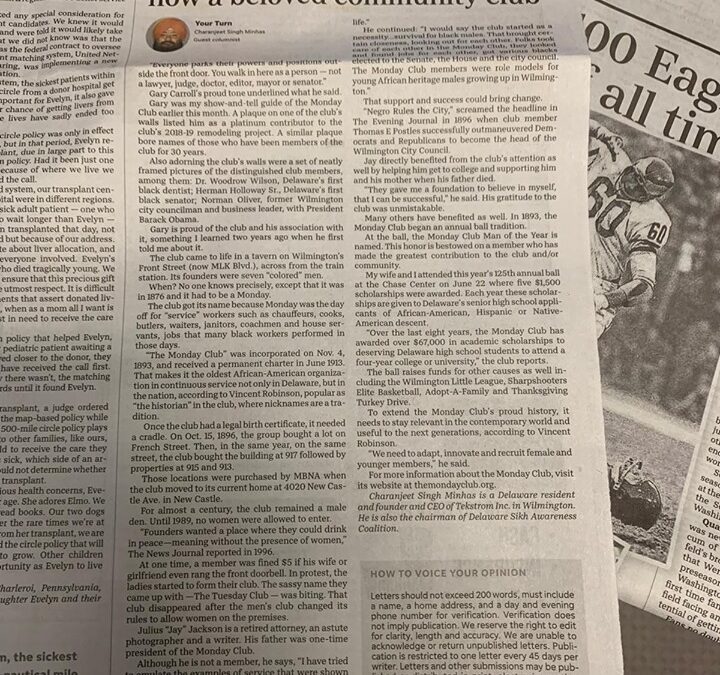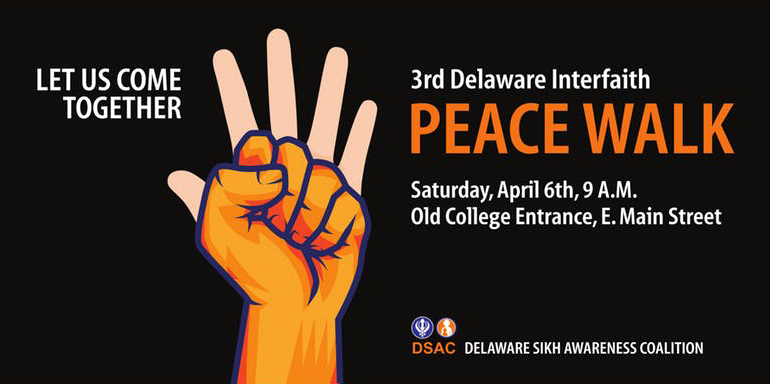“Everyone parks their powers and positions outside the front door. You walk in here as a person — not a lawyer, judge, doctor, editor, mayor or senator.”
Gary Carroll’s proud tone underlined what he said.
Gary was my show-and-tell guide of the Monday Club earlier this month. A plaque on one of the club’s walls listed him as a platinum contributor to the club’s 2018-19 remodeling project. A similar plaque bore names of those who have been members of the club for 30 years.
Also adorning the club’s walls were a set of neatly framed pictures of the distinguished club members, among them: Dr. Woodrow Wilson, Delaware’s first black dentist; Herman Holloway Sr., Delaware’s first black senator; Norman Oliver, former Wilmington city councilman and business leader, with President Barack Obama.
Gary is proud of the club and his association with it, something I learned two years ago when he first told me about it.
The club came to life in a tavern on Wilmington’s Front Street (now MLK Blvd.), across from the train station. Its founders were seven “colored” men.
When? No one knows precisely, except that it was in 1876 and it had to be a Monday.
The club got its name because Monday was the day off for “service” workers such as chauffeurs, cooks, butlers, waiters, janitors, coachmen and house servants, jobs that many black workers performed in those days.
“The Monday Club” was incorporated on Nov. 4, 1893, and received a permanent charter in June 1913. That makes it the oldest African-American organization in continuous service not only in Delaware, but in the nation, according to Vincent Robinson, popular as “the historian” in the club, where nicknames are a tradition.
Baltimore’s Arch Social Club earlier claimed the “most antique” tag until Vincent called them one day.
“Upon seeing the web page, I contacted the club and informed them of the Monday Club, Inc., and that their date of incorporation was 19 years later,” he said.
The Arch Social Club reacted to the news gracefully, Vincent said. A few weeks later it sent the Delaware club an invitation to visit, and eight members of The Monday Club drove to Baltimore for the fellowship opportunity.
Once the club had a legal birth certificate, it needed a cradle. On Oct. 15, 1896, the group bought a lot on French Street. Then, in the same year, on the same street, the club bought the building at 917 followed by properties at 915 and 913.
Those locations were purchased by MBNA when the club moved to its current home at 4020 New Castle Ave. in New Castle.
For almost a century, the club remained a male den. Until 1989, no women were allowed to enter.
“Founders wanted a place where they could drink in peace—meaning without the presence of women,” The News Journal reported in 1996.
At one time, a member was fined $5 if his wife or girlfriend even rang the front doorbell. In protest, the ladies started to form their club. The sassy name they came up with —The Tuesday Club — was biting. That club disappeared after the men’s club changed its rules to allow women on the premises.
Although women today remain frequent attendees, and even employees, there still are no females among the Monday Club’s 125 members.
Julius “Jay” Jackson is a retired attorney, an astute photographer and a writer. His father was one-time president of the Monday Club.
Although he is not a member, he says, “I have tried to emulate the examples of service that were shown to me by my father and other members of the club. I learned from an early age that I have an obligation to serve the community and make life better for others. I have tried to do this in my professional and personal life.”
He continued: “I would say the club started as a necessity…survival for black males. That brought certain closeness, looking out for each other. Folks took care of each other in the Monday Club, they looked and found jobs for each other, got various blacks elected to the Senate, the House and the city council. The Monday Club members were role models for young African heritage males growing up in Wilmington.”
That support and success could bring change.
“Negro Rules the City,” screamed the headline in The Evening Journal in 1896 when club member Thomas E Postles successfully outmaneuvered Democrats and Republicans to become the head of the Wilmington City Council.
Jay directly benefited from the club’s attention as well by helping him get to college and supporting him and his mother when his father died.
“They gave me a foundation to believe in myself, that I can be successful,” he said. His gratitude to the club was unmistakable.
Many others have benefited as well. In 1893, the Monday Club began an annual ball tradition.
At the ball, the Monday Club Man of the Year is named. This honor is bestowed on a member who has made the greatest contribution to the club and/or community.
My wife and I attended this year’s 125th annual ball at the Chase Center on June 22 where five $1,500 scholarships were awarded. Each year these scholarships are given to Delaware’s senior high school applicants of African-American, Hispanic or Native-American descent.
“Over the last eight years, the Monday Club has awarded over $67,000 in academic scholarships to deserving Delaware high school students to attend a four-year college or university,” the club reports.
The ball raises funds for other causes as well including the Wilmington Little League, Sharpshooters Elite Basketball, Adopt-A-Family and Thanksgiving Turkey Drive.
To extend the Monday Club’s proud history, it needs to stay relevant in the contemporary world and useful to the next generations, according to Vincent Robinson.
“We need to adapt, innovate and recruit female and younger members,” he said.
For more information about the Monday Club, visit its website at themondayclub.org.
– – – – –
This column was published online by the News Journal/Delawareonline.com on Monday, August 12, and printed in its Monday, August 12th edition.
Print Version:https://charanjeetsinghminhas.com/wp-content/uploads/2019/08/once_a_refge.jpg



Recent Comments